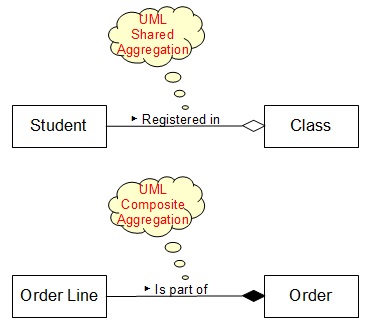UML Tutorials - Herong's Tutorial Examples - v1.05, by Herong Yang
Class Diagram - Aggregation and Composition Notations
This section describes Aggregation and Composition Notations used in a UML Class Diagram. Aggregation and Composition Notations represent a special type of association called 'aggregation' between a pair of parent and child classes, where the child class is considered as a part of the parent class.
Aggregation and Composition Notations are graphical notations used in a UML Class Diagram to represent a special type of association called "aggregation" between a pair of parent and child classes, where the child class is considered as a part of the parent class.
An aggregation has two variations:
1. Shared Aggregation (also called as "Aggregation") - In a shared aggregation, instances of the child class can exist without any instances of the parent class. Usually, the child class is shared by two or more parent classes as aggregation pairs.
For example, the "Class" class and the "Student" class are associated as a shared aggregation, because students are considered as parts of a class, but students can exist without registering to any class.
An Aggregation (shared aggregation) Notation is drawn as an Association Notation with a small diamond shape added to the parent class end.
2. Composite Aggregation (also called as "Composition") - In a composite aggregation, instances of the child class exist only if they are associated with instances of the parent class.
For example, the "Order" class and the "Order Line" class are associated as a composite aggregation, because order lines are considered as parts of an order, and order lines can not exist without an order.
A Composition (composite aggregation) Notation is drawn as an Association Notation with a small solid diamond shape added to the parent class end.
The following picture shows examples of a Shared Aggregation Notation and a Composite Aggregation Notation used in a UML class diagram:

Table of Contents
Introduction of UML (Unified Model Language)
►UML Class Diagram and Notations
Class Diagram - Class Notation
Class Diagram - Association Notation
Class Diagram - Association End Notation
Class Diagram - Association End Navigability Notation
►Class Diagram - Aggregation and Composition Notations
Class Diagram - Generalization Notation
Class Diagram - Realization Notation
Class Diagram - Dependency Notation
UML Activity Diagram and Notations
UML Sequence Diagram and Notations
UML State Machine Diagram and Notations
UML Use Case Diagram and Notations
LibreOffice Drawing Extension - UML Elements